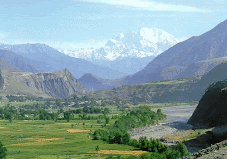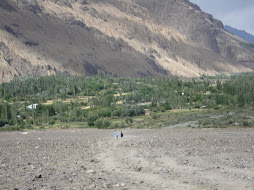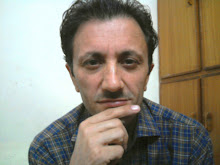By Anjum Niaz
We’ll never know why the 10-year-old Akbar ran after his father to stop him from going to Rawalpindi. Did he have a premonition?
Ashraf Liaquat Ali Khan, older by four years, remembers how his parents celebrated his 14th birthday at the then PM House in Karachi, barely two weeks before his father was assassinated.
“My whole class at Karachi Grammar School was invited.” Does Ashraf know who killed his father, now that new revelations blaming America surfaced in Washington when certain documents were declassified in 2006? “Was it really the Americans?” He can’t say, but “America wanted my father’s help in subduing the Iranians as they wanted Iranian oil. But he refused.” Adding another twist to the mystery, Ashraf tells me, “The plane carrying the inquiry officer on board who had the answers to who killed my father was blown to smithereens in midair. We were told that there was no other copy of the investigation.”
Was Army Chief General Asif Nawaz poisoned? If you talk to his brother Shuja Nawaz, author of Crossed Swords, you get the idea that he was. If you talk to General ( retd) Naseeruallah Babar, you’re told in no uncertain words that he was not. And if you talk to an army doctor who was connected with the case, you get a whole new dimension.
Who killed Benazir Bhutto? If you believe her widower Asif Zardari, you’d agree with him that the establishment had a hand and therefore only a UN inquiry costing the taxpayers millions of dollars can solve the mystery. If you talk to a head of a security firm in Karachi who was asked to provide the armoured SUV’s (sports utility vehicles) for Benazir Bhutto you’re told that Rehman Malik asked for sun roofs to be installed in the cars. Every security firm in Pakistan responded with an emphatic ‘No.’ Said one, “How can an armoured car have a sun roof? The whole idea of security is killed. Think about it,” they argue.
Who killed Prime Minister Liaquat Ali Khan? “Right up to the day my mother died, she wanted to know who killed my father,” says Ashraf. If you read the declassified documents on the Internet, you discover that America was behind the murder. And if you ask Ashraf again if the Indians did it, he quotes his mother, Begum Ra’ana Liaquat who was pointedly told by the bigwigs in India that they had no hand in the foul play. If you ask around you’re told by some that the politicians of those days in cahoots with the army had the first prime minister of Pakistan eliminated.
Confusion worst confounded.
Still, it’s the right of every Pakistani to ask who killed the above three VVIPs. We draw a blank from our establishment in BB’s case while the establishment has conveniently closed its files on Liaquat Ali Khan’s assassination and General Asif Nawaz’s sudden death. In the former’s case, we don’t have an answer from the establishment, while in the latter’s case, the government has told us that the Army Chief died of a heart attack.Brother Shuja Nawaz - journalist, military analyst and author was in Islamabad recently from Washington. In his book Crossed Swords, he has reproduced anonymous letters written by the staff serving Prime Minister Nawaz Sharif who allege that they would dust the dinner plates with arsenic powder every time Asif Nawaz came for a meal at the PM’s house. Furthermore, the author has reproduced in full the forensic reports of well known doctors based on an examination of the deceased’s hair. Their verdict: Asif Nawaz had high levels of arsenic in his blood that could kill. General ( retd) Babar called me up from Peshawar to refute the claim, saying he sent samples to France and Russia which were negative.
Whom does one believe? I ask Shuja Nawaz. He thinks Naseerullah Babar’s memory is playing tricks. “Where did he get hold of my brother’s hair?” he says, “We never gave it to him.” When I ask Babar, he tells me, “well, I’ve told you everything that there is to tell. Nawaz Sharif is innocent, there was no foul play but if the family (Shuja Nawaz ) doesn’t want to believe it, then it’s their personal affair.”
A retired brigadier who served in the army medical corps adds another dimension to the mystery. He says the late COAS was taking energy boosting pills that contained safe levels of arsenic. When I ask Shuja Nawaz, he hotly denies the story.
Talking about sensitivities, Ashraf Ali Khan recalls the Christmas Day in 1947 when his father in a fit of anger sent in his resignation. His parents had been invited to celebrate Christmas with the Quaid and Miss Fatima Jinnah. “After lunch the Quaid took my father aside and asked him why Begum Ra’ana Liaquat did not sit on the same sofa where Miss Jinnah was sitting and why she had declined a glass of sherry which her host wanted her to partake of.
The Quaid was visibly annoyed. So, when my father came home he sent in his resignation!” Had the resignation been accepted, the first prime minister of Pakistan could have died a natural death, instead of being gunned down in Rawalpindi and leaving no clues behind of his murderers.--Dawn Magazine
Sunday, September 7, 2008
Subscribe to:
Post Comments (Atom)
Awesome and rugged

Beauty of Chitral

Kishmanja, a beautiful village in Yarkhun valley
Lush green

DIZG: threatened by floods

The legendary village of Ayun in Chitral

On way to Bumburet
Dizg, Yarkhun

Blog Archive
-
▼
2008
(197)
-
▼
September
(60)
- The wishy-washy Ruet Committee
- Leaseing of resources to outsiders slammed
- Transparency in zakat card distribution stressed
- Tributes paid to martyred policemen
- Hiring of outsiders as grain supervisors opposed
- Most schools in Chitral without science teachers
- Boy killed, mother injured in accident
- PTCL phones partially restored
- TOURISM IN THE DOLDRUMS
- Road to Yarkhun valley reopens after five months
- Hotel Haut Monde
- Chitrali injured in Marriott blast improving
- Jashn-i-Chitral could have attracted terrorists, n...
- Five killed, one injured in accident
- Eight feared dead in Chitral accident
- Call to enhance Chitral border security
- MNA angry over non-release of uplift funds
- Car donated to DHQ hospital used as taxi by doctor
- Protest held in Chitral against price hike
- Bird hits Chitral-bound PIA plane
- Killed suicide bomber used fake Chitrali identity
- Chitral peace body vows to keep militants away
- Body of Marriott blast victim buried in Bang
- Students suffer due to lack of hostels
- Cancellation of Jashn-i-Chitral justified
- Over 75pc work on Lowari tunnel access roads compl...
- Two tribes in Bumburet end feud; ox goes to the Sh...
- Chitral residents reject raise in water rates
- Chitrali victim of Marriott blast dies
- Chitrali injued in Marriott blast critical
- Chitralis the music lovers
- Floods can wipe out Kalash valley, say elders
- Woman released on HR activists' intervention
- Boy commits suicide in Kosht
- Three Chitralis injured in Marriott blast
- Chitralis working in Marriott Hotel are safe
- Freezing of Chitral's uplift funds criticised
- Suicide blast at Marriott Islamabad
- Funds for Yarkhun bridge released
- Decision to cancel Chitral festival slammed
- Flashfloods damage schools in Reshun
- MNA's decision to join PPP hailed
- Jashn-i-Chitral cancelled
- British paraglider injured in Chitral
- Two-month marble mosaic training workshop begins
- HR body elects office-bearers for Mastuj
- Call to open passport office in Chitral
- <!--google_ad_client = "pub-2976157137802820";/* 7...
- MPA seeks more uplift funds for Mastuj area
- Public library still a far cry in Chitral
- Chitral farmers provided incentives
- PPP Chitral congratulates Zardari
- Five-day Jashn-i-Chitral from Oct 11
- Who killed 'em?
- Trophy hunting becomes vital conservation tool
- Asif Zardari elected President of Pakistan
- Kalash village threatened by floods
- Death on the Farang Bur
- Marble city planned in Chitral
- Call to appoint doctors in health centres of Mastuj
-
▼
September
(60)
About Me

- Zar Alam Khan Razakhel
- Village Dizg, Yarkhun valley, Chitral, Pakistan
- I blog at http://chitraltoday.net (ChitralToday) about Chitral, its people, culture, traditions and issues. I have been writing about Chitral since 2000. Chitral is a scenic valley in the extreme north-west of Pakistan.
No comments:
Post a Comment